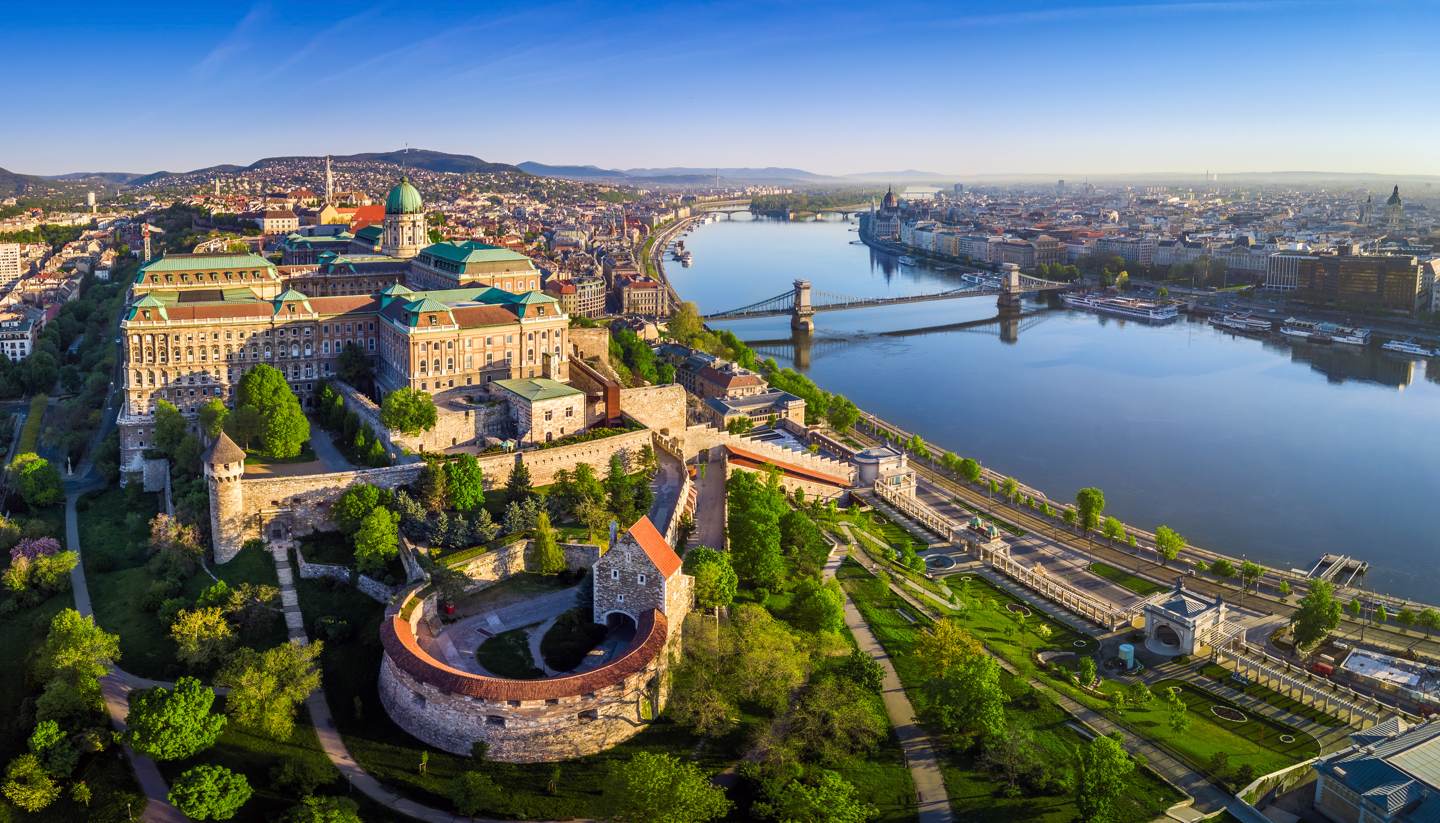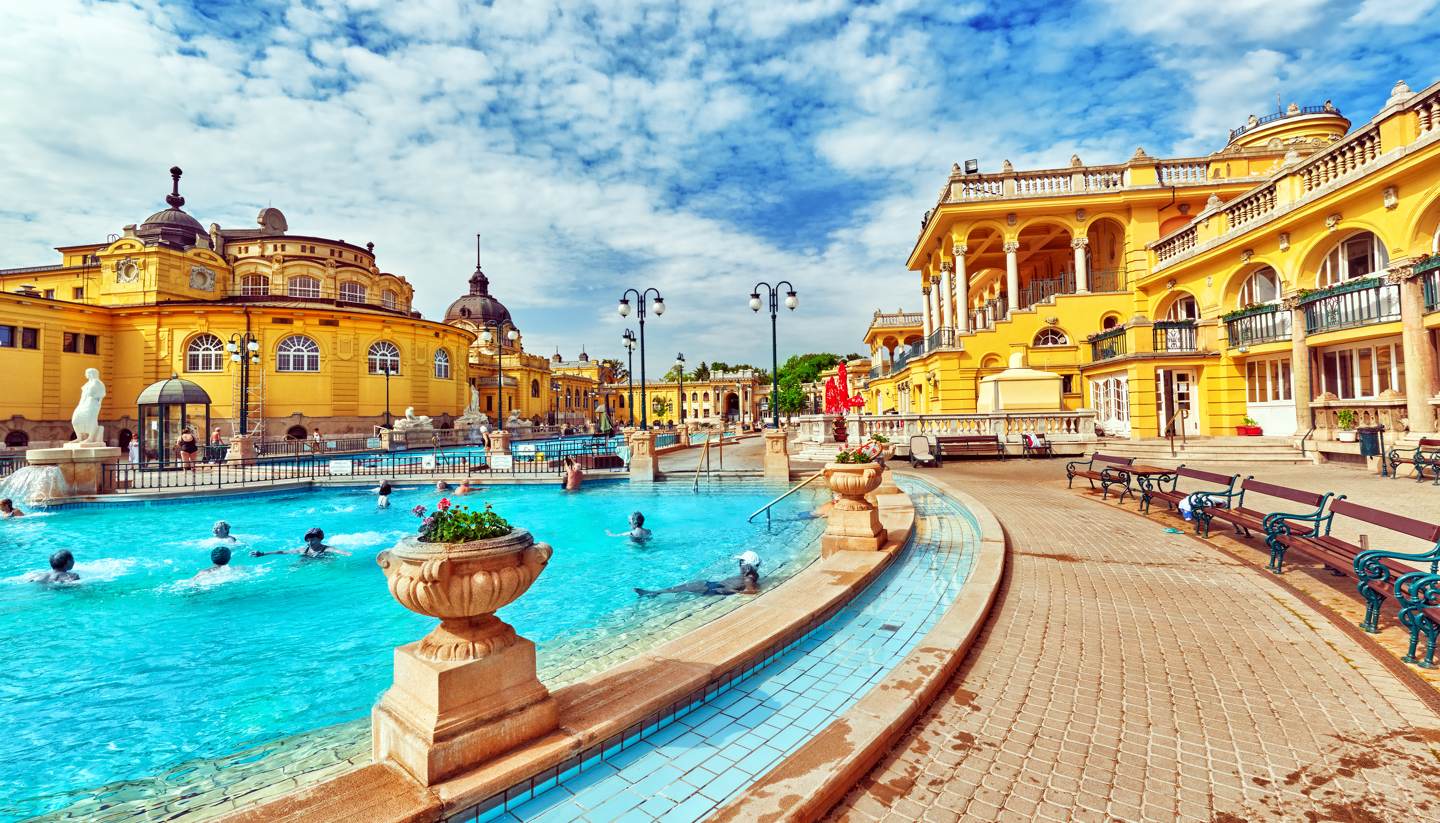Hungary travel guide
About Hungary
Culturally and linguistically distinct from all of its immediate neighbours, Hungary is very much the ‘odd one out’ in Central Europe, but for all the most honourable reasons.
This is a nation whose capital, Budapest, can hold up a mirror to classical Vienna; it’s a world of well-preserved castles, seductively good wines and quiet stoic pride; a landscape of low-lying mountains, oak forests and thermal springs.
The Romans were the first to make use of the hot waters, originally for medicinal purposes. Today, the pursuit is relaxation and over time the bathhouses have grown into splendid architectural affairs, most notably in Budapest.
The capital is an elegant, stylish and lively city made up of two separate settlements clustered on either side of the Danube River: hilly Buda has a wealth of graceful Habsburg and neoclassical buildings, while sprawling Pest is its commercial centre with a generous scattering of art nouveau architecture and an ad-hoc party scene.
The city has long been the focus of Hungary’s artistic, musical and literary community and is by far the best place in the country for a choice of bars, restaurants and nightclubs.
Smaller cities are equally architecturally fascinating and deserving of a visit in their own right: Pécs for its museums; Eger for it’s fortifications and infamous Bull’s Blood Wine; and Györ whose grand Basilica houses the golden herm of László.
Beyond these urban centres, Hungary’s bathes in natural delights. South west of Budapest is Lake Balaton, Central Europe’s largest body of freshwater, where locals spend hot summers cooling off in waters that average 20°C (68°F).
In winter, Hungary freezes, and thrill seekers head north to the Bakony Hills for the chance to ski through the forests before unwinding with a dip in the thermal spa.
It may be landlocked, but Hungary is a country content on ploughing its own furrow no matter what seeds its neighbours are sewing and is all the better for it.
Key facts
93,028 sq km (35,918 sq miles).
9,821,318 (UN estimate 2016).
106.4 per sq km.
Budapest.
Parliamentary Republic.
President Katalin Novák since 2022.
Prime Minister Viktor Orbán since 2010.
Travel Advice
The Foreign, Commonwealth & Development Office (FCDO) provides advice about risks of travel to help British nationals make informed decisions. Find out more about FCDO travel advice.
Before you travel
No travel can be guaranteed safe. Read all the advice in this guide as well as support for British nationals abroad which includes:
- advice on preparing for travel abroad and reducing risks
- information for women, LGBT+ and disabled travellers
Follow and contact FCDO travel on Twitter, Facebook and Instagram. You can also sign up to get email notifications when this advice is updated.
Travel insurance
If you choose to travel, research your destinations and get appropriate travel insurance. Insurance should cover your itinerary, planned activities and expenses in an emergency.
This advice reflects the UK government’s understanding of current rules for people travelling on a full ‘British citizen’ passport from the UK, for the most common types of travel.
The authorities in Hungary set and enforce entry rules. If you’re not sure how these requirements apply to you, contact Hungary’s embassy or consulate in the UK.
COVID-19 rules
Countries may restrict travel or bring in rules at short notice. Check with your travel provider.
If you test positive for COVID-19, you may need to stay where you are until you test negative. You may also need to get treatment there.
You should also read TravelHealthPro’s general COVID-19 advice for travellers.
Passport validity requirements
To travel to Hungary, you must follow the Schengen area passport requirements.
To enter Hungary (and all Schengen countries) your passport must:
- have a ‘date of issue’ less than 10 years before the date you arrive. Passports issued after 1 October 2018 are now valid for only 10 years, but for passports issued before 1 October 2018, extra months may have been added if you renewed a passport early
- have an ‘expiry date’ at least 3 months after the day you plan to leave
Contact the Hungarian Embassy in the UK if your passport does not meet both these requirements.
Check with your travel provider that your passport and other travel documents meet requirements. Renew your passport if you need to.
You will be denied entry if you do not have a valid travel document, or try to use a passport that has been reported lost or stolen.
Checks at border control
From 21 October, temporary border checks have been introduced at Hungary’s borders with Slovenia. You should allow extra time for crossing the land border between Hungary and Slovenia, and be ready to show your passport or residency card if you are asked to do so by the border police. Checks may also involve vehicle inspections.
Make sure you get your passport stamped
If you’re a visitor, your passport must be stamped when you enter or leave the Schengen area (which includes Hungary). Border guards will use passport stamps to check you have not overstayed the 90-day visa-free limit for stays in the Schengen area. If your passport was not stamped, border guards will presume you have overstayed the visa-free limit.
If your passport was not stamped, show evidence of when and where you entered or left the Schengen area (for example, boarding passes or tickets) and ask the border guards to add the date and location in your passport.
If you live in Hungary, read our Living in Hungary guide for passport stamping information.
At Hungarian border control, you may also need to:
- show a return or onward ticket
- show you have enough money for your stay
- show proof of accommodation, for example, a hotel booking
Visa requirements
You can travel without a visa to the Schengen area (including Hungary) for up to 90 days in any 180-day period. This applies if you travel:
- as a tourist
- to visit family or friends
- to attend business meetings, cultural or sports events
- for short-term studies or training
If you’re travelling to Hungary and other Schengen countries without a visa, make sure your whole visit is within the 90-day limit. Visits to Schengen countries in the 180 days before you travel count towards your 90 days.
To stay longer (to work or study, for business travel or for other reasons), you must meet the Hungarian government’s entry requirements. Check which type of visa or work permit you need with the Hungarian Embassy in the UK.
If you stay in Hungary with a residence permit or long-stay visa, this does not count towards your 90-day visa-free limit.
Extending your visa
To extend your visa, see guidance from the Hungarian government National Directorate General for Aliens Policing.
Unpaid fines
If you have an unpaid fine in Hungary, you may be denied entry. Contact the Hungarian Embassy in the UK for guidance on paying any outstanding fines.
Vaccination requirements (other than COVID-19)
At least 8 weeks before your trip, check the vaccinations and certificates you need in TravelHealthPro’s Hungary guide.
Customs rules
There are strict rules about goods that can be brought into and taken out of Hungary, including pets, hunting weapons, alcohol and tobacco products and medicines containing drugs. You must declare anything that may be prohibited or subject to tax or duty. More information is available from the National Tax and Customs Administration of Hungary.
Taking food and drink into the EU
You cannot take meat, milk or products containing them into EU countries. There are some exceptions for medical reasons, for example certain amounts of powdered infant milk, infant food, or pet food required for medical reasons. Check the rules about taking food and drink into the EU on the European Commission website.
Taking money into Hungary
There are restrictions on the amount of cash you can bring into or take out of all EU countries, including Hungary. You must declare any amount over 10,000 euros (or equivalent). This includes cheques, travellers’ cheques, money orders, etc. This does not apply if you are travelling through the EU to a non-EU country, as long as the original journey started outside of the EU. It also does not apply if you are travelling within the EU.
Terrorism
There is a high threat of terrorist attack globally affecting UK interests and British nationals, including from groups and individuals who view the UK and British nationals as targets. You should remain vigilant at all times.
UK Counter Terrorism Policing has information and advice on staying safe abroad and what to do in the event of a terrorist attack. Find out how to reduce your risk from terrorism while abroad.
Terrorism in Hungary
Terrorist attacks in Hungary cannot be ruled out.
Political situation
Political demonstrations can take place in Budapest and across Hungary. Demonstrations often happen around important national holidays, such as 15 March (anniversary of 1848 Revolution) and 23 October (anniversary of 1956 anti-Soviet Uprising). Peaceful demonstrations have sometimes turned violent. Avoid demonstrations, monitor the local media and be aware of your surroundings.
Crime
Protecting your belongings
Tourists can be targets for petty crime in Hungary, especially in big cities. Take sensible precautions. Bag snatching and pick-pocketing are common, especially in Budapest. Theft of and from vehicles is common.
Take care:
- on busy public transport
- in train stations
- at markets
- in places with high numbers of tourists
Scams in restaurants, bars and clubs
Some restaurants, bars and clubs might charge high amounts for food and drink. Tourists have been taken to cashpoints with demands for the money to pay the bill. Always ask to see the menu and price list before ordering drinks or food, and check your bill carefully before paying. Be wary of establishments where menus do not properly display prices. Report any incidents to the police.
Some taxi drivers are part of these frauds. They may receive a commission to recommend certain bars, clubs and restaurants to passengers. If a taxi driver offers to take you to a bar or club, or you are approached on the street with an invitation, be cautious. Use taxis from a reputable local company.
Use official ATMs or banks. Do not change money on the street.
Drink and food spiking
There have been reports of drinks being spiked, particularly in Budapest bars. Buy your own drinks and keep sight of them at all times.
Laws and cultural differences
Personal ID
Carry your passport at all times. You must show ID if requested. A photocopy is not acceptable.
Illegal drugs and prison sentences
Hungarian laws on the possession and use of drugs are very strict and carry serious penalties and custodial sentences.
LGBT+ travellers
Same-sex relationships and civil partnerships are legal in Hungary but same-sex marriages are not recognised in Hungarian law. Budapest is generally tolerant and open. Recent Pride events have passed without incident, but historically there have been counter-events which have led to verbal, and sometimes physical, confrontation. Outside of Budapest, public affection may receive unwanted attention. Read more advice for LGBT+ travellers.
Outdoor activities and adventure tourism
Festivals
If you are going to a summer music festival in Hungary, see FCDO’s travel checklist for festivals in Europe.
Transport risks
Public transport
You could be fined if you do not follow the rules of the transport ticket system. Make sure:
- on the Metro, you validate your ticket before you get onboard at the entrance to the station
- on buses, trams or trolley buses, you validate your ticket immediately after boarding
- you keep your ticket until the end of your journey and show it to ticket inspectors if requested
- you validate a new ticket each time you change lines or mode of transport
- you have the special ticket which is required for the night service network
More information on ticket conditions and prices is available from the Budapest Transport Authority.
Road travel
If you are planning to drive in Hungary, see information on driving abroad and read the RAC guide.
Licences and permits
You can drive in Hungary with a UK driving licence.
If you’re living in Hungary, check the Living in Guide for information on requirements for residents.
Driving a British car abroad
You may need a UK sticker to drive your car outside the UK. In 2021, UK stickers replaced GB stickers. Check guidance on displaying number plates.
Driving regulations
Hungary has a no-alcohol driving policy. It is illegal to drink any alcohol and then drive in Hungary.
You must use headlights on roads outside towns even in daytime.
Toll roads
If you want to use major highways in Hungary, you must buy a motorway vignette (ticket) in advance of your journey. The vignette is a form of toll. If you use the roads without purchasing a vignette, you will be fined.
Haulage vehicles
If you are driving a large haulage vehicle through Hungary, make sure you have full vehicle documentation. International loads must be supported by a TIR carnet providing a full inventory of the goods being carried. You must leave a financial bond with the Hungarian customs when transiting Hungary with a cargo. The financial bond, minus an administration fee, is returned when you leave the country.
If you are planning to transit Hungary with consignments of humanitarian aid following a disaster, or medical aid, contact the Hungarian Embassy in London in advance to apply for a waiver.
Rail travel
Take care when travelling by train (domestically and internationally) and keep your belongings in sight. Take extra care on night trains. Travel with companions where possible and secure your compartment from the inside.
Before you travel check that:
- your destination can provide the healthcare you may need
- you have appropriate travel insurance for local treatment or unexpected medical evacuation
This is particularly important if you have a health condition or are pregnant.
Emergency medical number
Dial 112 and ask for an ambulance.
Contact your insurance or medical assistance company promptly if you’re referred to a medical facility for treatment.
For more information read guidance on healthcare when travelling in Europe.
Vaccinations and health risks
At least 8 weeks before your trip check:
- the latest information on vaccinations and health risks in TravelHealthPro’s Hungary guide
- where to get vaccines and whether you have to pay on the NHS travel vaccinations page
Medication
The legal status and regulation of some medicines prescribed or bought in the UK can be different in other countries.
Read best practice when travelling with medicines on TravelHealthPro.
The NHS has information on whether you can take your medicine abroad.
Healthcare facilities in Hungary
You can view a list of English speaking doctors in Hungary.
Health insurance cards
Apply for a free UK Global Health Insurance Card (GHIC) or European Health Insurance Card (EHIC) before leaving the UK. If you already have an EHIC, it will still be valid as long as it remains in date.
The GHIC or EHIC entitles you to state-provided medical treatment necessary during your trip. Any treatment provided is on the same terms as for Hungarian nationals. If you do not have your card with you or you’ve lost it, contact the NHS Overseas Healthcare Team.
It’s important to take out appropriate travel insurance for your needs. A GHIC or EHIC is not an alternative to travel insurance and you should have both before you travel. A or GHIC or EHIC does not cover all health-related costs, for example, medical repatriation, ongoing medical treatment and non-urgent treatment. Read more about what your travel insurance should cover.
GHIC and EHIC cover state healthcare only, not private treatment. You will be responsible for the cost of any treatment provided by a private doctor or private clinic.
Travel and mental health
Read FCDO guidance on travel and mental health. There is also mental health guidance on TravelHealthPro.
The Foreign, Commonwealth & Development Office (FCDO) cannot provide tailored advice for individual trips. Read this travel advice and carry out your own research before deciding whether to travel.
Emergency services in Hungary
Telephone: 112 (ambulance, fire, police)
Contact your travel provider and insurer
Contact your travel provider and your insurer if you are involved in a serious incident or emergency abroad. They will tell you if they can help and what you need to do.
Refunds and changes to travel
For refunds or changes to travel, contact your travel provider. You may also be able to make a claim through insurance. However, insurers usually require you to talk to your travel provider first.
Find out more about changing or cancelling travel plans, including:
- where to get advice if you are in a dispute with a provider
- how to access previous versions of travel advice to support a claim
Support from FCDO
FCDO has guidance on staying safe and what to do if you need help or support abroad, including:
- finding English-speaking lawyers, funeral directors and translators and interpreters in Hungary
- dealing with a death in Hungary
- being arrested in Hungary
- getting help if you’re a victim of crime
- what to do if you’re in hospital
- if you’re affected by a crisis, such as a terrorist attack
Contacting FCDO
Follow and contact FCDO travel on Twitter, Facebook and Instagram. You can also sign up to get email notifications when this travel advice is updated.
Help abroad in an emergency
If you are in Hungary and you need emergency help from the UK government, contact the British Embassy Budapest.
You can also contact FCDO online.
FCDO in London
You can call FCDO in London if you need urgent help because something has happened to a friend or relative abroad.
Telephone: 020 7008 5000 (24 hours)
Risk information for British companies
The Overseas Business Risk service offers information and advice for British companies operating overseas on how to manage political, economic, and business security-related risks.




